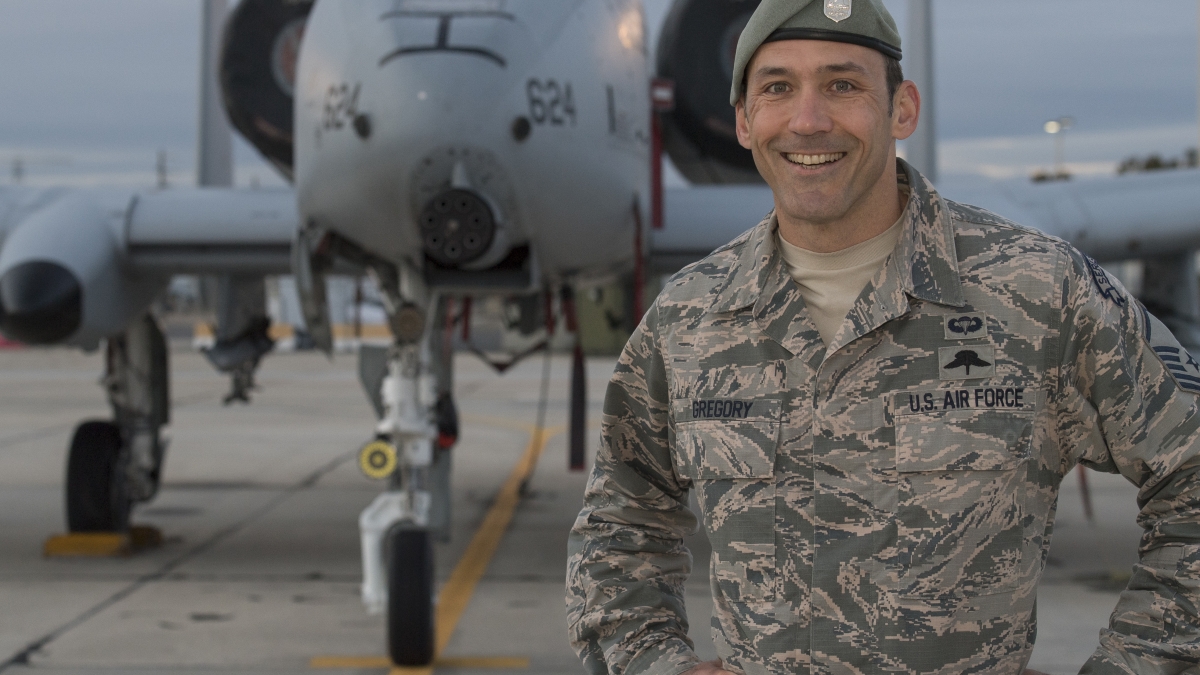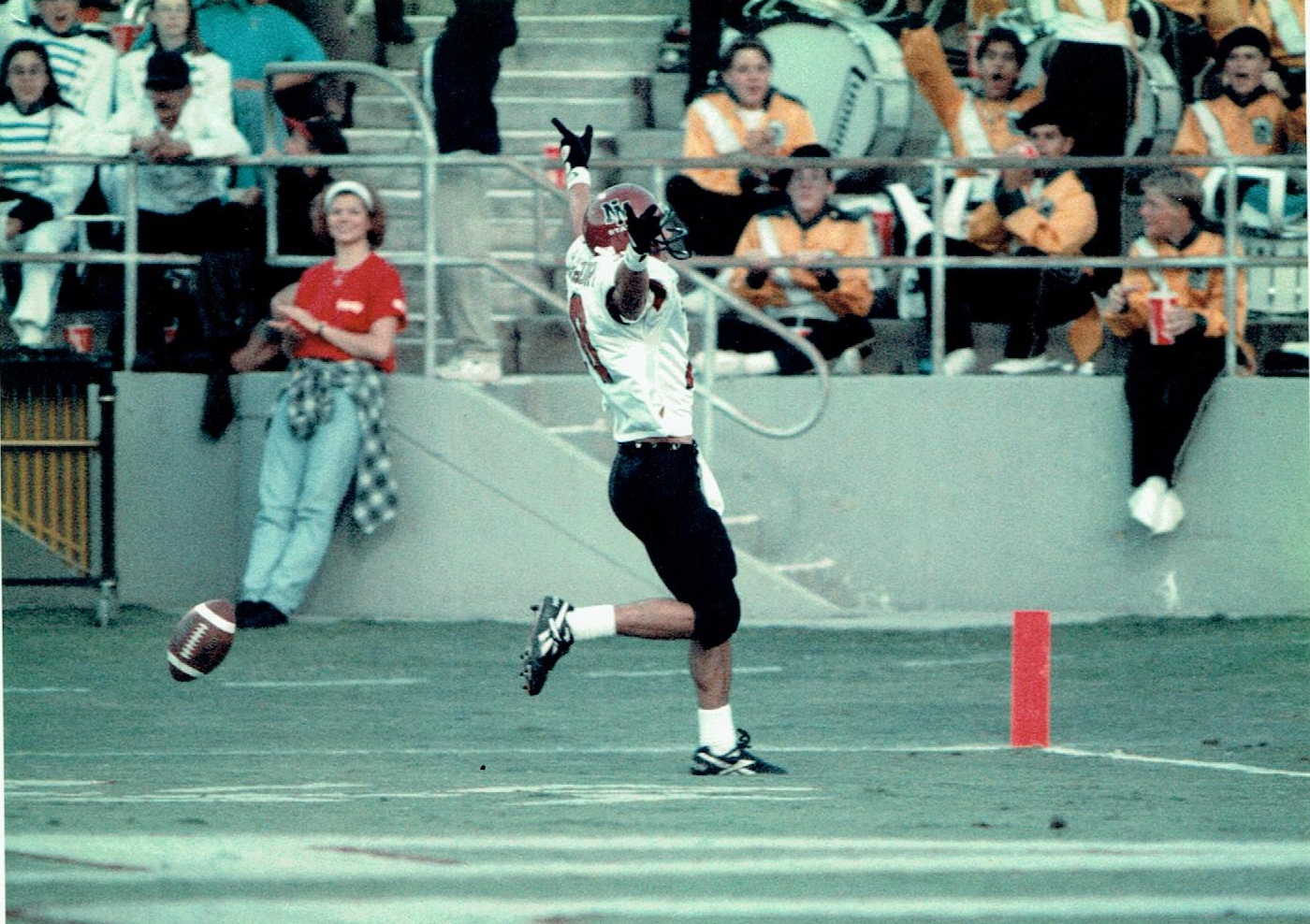Air Force Master Sgt. Duane Gregory can go into the wilderness with little more than a knife and a map and come out just fine weeks later.
Now, as he transitions back into civilian life, he’s earning a psychology degree from Arizona State University's New College so he can survive on the streets with as much ease.
“One of the main reasons that I'm going into psychology is so I can apply many of the things I've learned as a survival instructor to teach other people how to thrive day to day,” said Gregory, an ASU Online student taking classes remotely from Boise, Idaho. “I think there's a huge connection between what makes a great survivor and what helps people succeed every day in life.
“My real goal is to continue teaching people how to build their own fires. In the military it was literal; in psychology it'll be figurative.”
A quarter-century before, Gregory’s head was in another space — the football field. By the time he graduated New Mexico State University in 1997, he was their all-time leading receiver with many records to his name.
“Duane stood about 6’1” and was 195 pounds, super fast and great hands,” said Brian Dunlap, who attended NMSU with Gregory, and was also a hunting and fishing buddy. “He’s always been a driven individual. If he set his mind to do something, it was going to get done.”
One of Gregory’s wishes was to not only beat ASU, but to score a touchdown against their legendary defensive back, Pat Tillman. He achieved one of those goals; a touchdown catch against Tillman. However, the Aggies fell short that day to the Sun Devils, 41-10.
“Pat played football with great technical proficiency and with the right attitude you wanted to see in your teammates and adversary,” Gregory said. “He was intense and played the game right. He was one of those guys that you liked to compete against because he made you rise to the level of competition.”
Duane Gregory was a standout wide receiver at New Mexico State University and was their all-time leading receiver with many records to his name when he graduated in 1997.
Like Tillman, Gregory’s life was forever changed by the 9/11 terrorist attacks. He had played a year of arena football and was managing a Toys R Us and going through a “rough divorce” when the attacks occurred.
“I was ready to do something that had a purpose,” Gregory said. “After I talked to all the recruiters, it was clear that the Air Force was the best fit for me.”
Gregory enlisted in 2002 at the age of 26. After basic training, he was assigned to SERESERE stands for Survival, Evasion, Resistance and Escape. School near Spokane, Washington. There Gregory learned the art of outdoor survival, which included locating and purifying a water source, building shelter and fires, using traps and snares and mastering the techniques of rescue science.
He was deployed in Turkey, Kuwait, and Honduras, teaching pilots how to survive in case of a crash or capture.
“As a child I was taught the concept of teaching a man to fish and remember thinking how profound that was at the time,” said Gregory, who is still active duty with 17 years of service. “Now I figuratively teach people how to survive anywhere in the world under any livable condition and catch their own fish. It’s the thing that has meant the most in my military career.”
Gregory's military career will come to an end in 2022, and he knows he must learn to fish in another pond. While at NMSU, he earned a bachelor’s degree in horticulture. He said that served him well in the military, but he wanted to obtain another degree for life after the service. He chose ASU to pursue his master’s degree in psychology.
His selection was influenced by wife, Carrie, who graduated in May from the College of Health Solutions.
“I had a great experience working with ASU and when Duane was looking for a school, he definitely took the time to look at the schools that were offering what was useful to him,” Carrie said.
Carrie said psychology is a nice match for her husband’s personality and skill sets.
“He’s the type of person who thinks deeply about things and always asks the larger why questions,” she said. “He works in a setting where people are forced to ask about the larger things in life."
One of those questions Gregory asked of himself was, why, in similar situations, do some people live and others die? It’s something he thinks he knows the answer to but wants to put under the research microscope.
“The answer has led me to believe it’s what happens between a person’s ears,” Gregory said. “It boils down to resilience.”
Gregory has been teaching resilience training to airmen for more than a decade and believes those same concepts can be taught to people who are struggling with weight loss, diabetes, depression, gratitude and confidence.
One of his early subjects was Eric McNair, who was a subordinate under Gregory in Little Rock, Arkansas, for a four-year period. McNair, who is now a SERE specialist at Fairchild Air Force Base in Washington, said he was lacking confidence and not an ideal airman when he first came under Gregory’s authority.
“At SERE, most of the leaders are A-type personalities who take control of everything but don’t have the emotional connection with individuals like Sgt. Gregory,” McNair said. “They are of the mindset, 'Do what I say because I say to do it.' Sgt. Gregory would say, ‘Do this, but here’s why we do this.’ And if you don’t do well at it, he shows you how to do it better. He tries to shape individuals to be the best they can be.”
McNair said that he was “not one of the best airmen in the Air Force and struggled with a lot of things” but that Gregory took him under his wing and worked with him daily to boost his confidence, helping him learn how to lead men and improve communication with his superiors. Today, McNair is a supervisor and is teaching others how to survive.
“I take what that man (Gregory) did for me and I do it for my airmen,” McNair said. “I owe my career to him.”
Gregory, who is contemplating a career in academia or counseling, said the skills learned in the military could easily be applied to civilians.
“My passion is to help people uncover some of those hidden strengths that we all have but didn’t know we have,” said Gregory, who expects to graduate in December. “When life throws us a curveball, we have to ask, ‘Now what?’ We have to have the resilience to move forward. To build our fire, no matter the storm.”
Top photo: ASU online student and Air Force Master Sgt. Duane Gregory standing in front of an A-10 Thunderbolt II at the Idaho Air National Guard in Boise. Photo courtesy of Joshua C. Allmaras
More Science and technology

Beyond the 'Dragon Arc': Unveiling a treasure trove of hidden stars
NASA's James Webb Space Telescope (JWST) has set a new milestone: capturing images of over 40 individual stars in a galaxy so distant that its light has traveled since the universe was only half its…

ASU selected as home and partner for CHIPS and Science Act-funded national facility for semiconductor advanced packaging
Following a week where a spirited effort by the Sun Devil football team captured the nation’s attention in the Peach Bowl, it is Arizona State University’s capability as a top-tier research…

ASU professor shares the science behind making successful New Year's resolutions
Making New Year’s resolutions is easy. Executing them? Not so much.But what if we're going about it all wrong? Does real change take more than just making resolutions?Michelle Shiota thinks so. …

